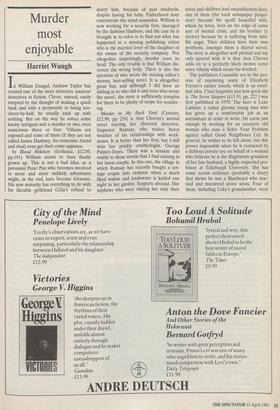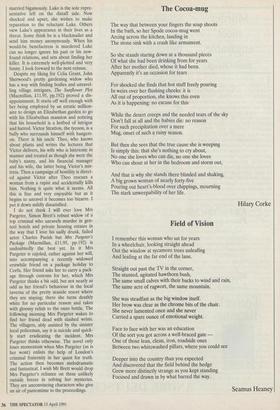Murder most enjoyable
Harriet Waugh
In William Dougal, Andrew Taylor has created one of the most attractive amateur detectives in fiction. Clever, amoral, easily tempted by the thought of making a quick buck and with a propensity to being too- clever-by-half, he usually ends up with nothing. But on the way he solves some knotty intrigues and a murder or two, even sometimes three or four. Villains are exposed and some of them (if they are not called James Hanbury, his sometime friend and rival) even get their come-uppance.
In Blood Relation (Gollancz, £12.95, pp.191) William seems to have finally grown up. This is not a bad idea, as a perennial Peter Pan who becomes involved in more and more unlikely adventures might, in the end, have become tiresome. His new maturity has everything to do with his likeable girlfriend Celia's refusal to marry him, because of past misdeeds, despite having his baby. Fatherhood does concentrate the mind somewhat. William is now working for a security firm, managed by the dubious Hanbury, and the case he is brought in to solve is to find out what has happened to a missing publishing editor who is the married lover of the daughter of the owner of the security company. Not altogether surprisingly, murder rears its head. The only trouble is that William dis- covers the wrong body. There is also the question of who wrote the missing editor's steamy, best-selling novel. It is altogether great fun, and although I did have an inkling as to who did it and even who wrote the novel, the story is sufficiently complex for there to be plenty of scope for wonder- ing. Murder in My Back Yard (Century, £12.99, pp 256) is Ann Cleeves's second novel starring her divorced detective, Inspector Ramsay, who makes heavy weather of his relationships with work- mates. It is better than her first, but I still miss her prickly ornithologist, George Palmer-Jones. There was a tension and reality to those novels that I find missing in her latest couple. In this one, the village in which Ramsay has recently bought a cot- tage erupts into violence when a much liked widow and landowner is knifed one night in her garden. Suspects abound. Her nephews who were visiting her with their wives and children lead unsatisfactory lives, one of them (the local newspaper propri- etor) because his spoilt beautiful wife, whom he loves, lives on the edge of some sort of mental crisis, and his brother (a doctor) because he is suffering from mid- life angst. Their children have their own problems, amongst them a shared secret. The story is altogether well plotted and my only quarrel with it is that Ann Cleeves adds on to a perfectly likely motive some extra villainy which seems far-fetched.
The publishers Constable are in the pro- cess of reprinting some of Elizabeth Ferrars's earlier novels, which is an excel- lent idea. I had forgotten just how good she is. The Seven Sleepers (£11.95, pp. 222 ) was first published in 1970. The hero is Luke Latimer, a rather gloomy young man who has given up a comfortable job as an accountant in order to write. He earns just enough by working for an eccentric old woman who runs a Solve Your Problem agency called Good Neighbours Ltd. In general, he wishes to be left alone, but this proves impossible when he is contacted by a dubious private eye on behalf of a woman who believes he is the illegitimate grandson of her late husband, a highly respected pro- fessor at Edinburgh University. She has come across evidence (probably a diary) that shows he was a Bluebeard who mar- ried and murdered seven wives. Four of them, including Luke's grandmother, were married bigamously. Luke is the sole repre- sentative left on the distaff side. Now shocked and upset, she wishes to make reparation to the reluctant Luke. Others view Luke's appearance in their lives as a threat. Some think he is a blackmailer and send him money anonymously. When his would-be benefactress is murdered Luke can no longer ignore his past or his new- found relations, and sets about finding her killer. It is extremely well-plotted and very funny. I look forward to the next reissue.
Despite my liking for Celia Grant, John Sherwood's pretty gardening widow who has a way with finding bodies and unravel- ling village intrigues, The Sunflower Plot (Macmillan, £11.95, pp.192) proved a dis- appointment. It starts off well enough with her being employed by an erratic million- aire to design an Elizabethan garden to go with his Elizabethan mansion and noticing that his household is a hotbed of intrigue and hatred. Victor Stratton, the tycoon, is a bully who surrounds himself with hangers- on. There is his uncle Theo, who knows about plants and writes the lectures that Victor delivers, his wife who is histrionic in manner and treated as though she were the baby's nanny, and his financial manager and his wife, the latter being Victor's mis- tress. Then a campaign of hostility is direct- ed against Victor after Theo rescues a woman from a rapist and accidentally kills him. Nothing is quite what it seems. All this is fine and very enjoyable but as it begins to unravel it becomes too bizarre. I put it down mildly dissatisfied.
I do not think I will ever love Mrs Pargeter, Simon Brett's robust widow of a top criminal who unravels murder in gen- teel hotels and private housing estates in the way that I love his sadly drunk, failed actor Charles Parish but Mrs Pargeter's Package (Macmillan, £11.95, pp.192) is undoubtedly the best yet. In it Mrs Pargeter is cajoled, rather against her will, into accompanying a recently widowed erstwhile friend on a package holiday to Corfu. Her friend asks her to carry a pack- age through customs for her, which Mrs Pargeter thinks a bit odd, but not nearly as odd as her friend's behaviour in the local taverna of the pretty seaside resort where they are staying; there she turns deathly white for no particular reason and takes with gloomy relish to the ouzo bottle. The following morning Mrs Pargeter wakes to find her friend dead with slashed wrists. The villagers, ably assisted by the sinister local policeman, say it is suicide and quick- ly start eradicating the incident. Mrs Pargeter thinks otherwise. The novel only loses momentum when Mrs Pargeter (as is her wont) enlists the help of London's criminal fraternity in her quest for truth. The action then becomes melodramatic and fantastical. I wish Mr Brett would drop Mrs Pargeter's reliance on these unlikely outside forces in solving her mysteries. They are unconvincing characters who give an air of pantomime to the proceedings.



























































 Previous page
Previous page